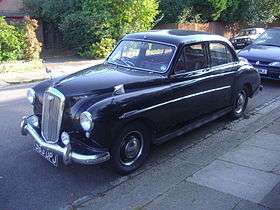Wolseley 15/50
| Wolseley 15/50 | |
|---|---|
 | |
| Overview | |
| Manufacturer | BMC |
| Production |
1956-1958 12,352[1] |
| Designer | Gerald Palmer |
| Body and chassis | |
| Body style | 4-door saloon |
| Related | MG Magnette |
| Powertrain | |
| Engine | 1489 cc B-Series straight-4 |
| Transmission | 4-speed manual |
| Dimensions | |
| Wheelbase | 102 in (2,600 mm)[2] |
| Length | 173 in (4,400 mm)[2] |
| Width | 61 in (1,500 mm)[2] |
| Height | 60 in (1,500 mm)[2] |
| Chronology | |
| Predecessor | Wolseley 4/44 |
| Successor | Wolseley 15/60 |
The Wolseley 15/50 was an updated version of the Wolseley 4/44. The main change was the engine; the 4/44 used a pre BMC Morris XPA unit and after the MG TF stopped production it was the only car still fitted with it. To rationalise production the 15/50 was launched with the BMC B-series engine fitted. Much of the design was shared with the MG Magnette, although some of the panels of the MG Magnette ZA/ZB (e.g. the boot and rear wings) are not interchangeable with those of the Wolseley 15/50, as stated in Practical Classics.
Unlike the MG, the 15/50 engine had only a single SU carburettor so the power output was slightly less at 55 bhp (41 kW) at 4400 rpm.[2] Unlike the 4/44, the 15/50 had a floor gear change. From 1956 a "Manumatic" two pedal (centrifugal clutch) transmission was an option. This was controlled by a micro switch hidden in the gear lever operating a vacuum servo. Having no synchromesh on bottom gear could make changes into the lowest ratio, which would normally require double declutching, difficult.[2]
The construction was monocoque with independent suspension at the front by coil springs and a live rear axle with semi elliptic leaf springs. The steering was rack and pinion and Lockheed brakes were fitted with 9 in (230 mm) drums all round[2]
In keeping with the up-market positioning of the Wolseley brand the car had upmarket trim with polished walnut dashboard and door cappings and leather seats and a traditional Wolseley radiator grille with illuminated badge. The individual front seats were placed very closely together to allow the car to be used as a six seater albeit marginal but it was usually sold as a four seater. The handbrake lever was under the dash. A heater was fitted as standard.
Performance
An example with Manumatic transmission tested by the British The Motor magazine in 1957 had a top speed of 77.9 mph (125.4 km/h) and could accelerate from 0-60 mph (97 km/h) in 26.7 seconds. A fuel consumption of 28.7 miles per imperial gallon (9.8 L/100 km; 23.9 mpg-US) was recorded. The test car cost £1011 including taxes of £338.[2]
It was replaced in 1958 by the Farina styled Wolseley 15/60.